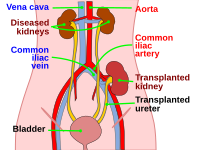
Photo from wikipedia
Importance Kidney transplant (KT) and liver transplant (LT) in HIV-positive patients have become more widely adopted. Data looking at long-term outcomes of patient and graft survival are lacking. Objective To… Click to show full abstract
Importance Kidney transplant (KT) and liver transplant (LT) in HIV-positive patients have become more widely adopted. Data looking at long-term outcomes of patient and graft survival are lacking. Objective To compare the long-term outcomes of KT and LT in HIV-positive recipients with matched HIV-negative recipients. Design, Setting, and Participants Retrospective, single-center, cohort, study using data from 2000 to 2019. Patients were observed until death, or graft failure requiring retransplant. All HIV-positive patients who underwent KT and/or LT between 2000 and 2019 were included. Propensity matching was performed to the corresponding HIV-negative cohort, which was obtained from the University of California, San Francisco's transplant recipient registry. The data were analyzed from 2020 to 2021. Exposures HIV infection. Main Outcomes and Measures Patient and graft survival for KT and patient survival for LT. Incidence of acute rejection and its association with KT graft survival. Results For KT, 655 HIV-negative recipients (mean [SD] age, 52.3 [13.6] years; 450 [68.7%] were men) and 119 HIV-positive recipients (mean [SD] age, 51.7 [9.4] years; 86 [72.3%] were men) were included. Patient survival was 79.6% (95% CI, 73.6%-86.1%) and 53.6% (95% CI, 38.9%-74.0%) at 15 years posttransplant, respectively. Graft survival was 57.0% (95% CI, 47.8%-68.0%) and 75.0% (95% CI, 65.3%-86.2%) at 15 years posttransplant, respectively. Diagnosis of HIV was not associated with worse graft survival (hazard ratio, 1.09; 95% CI, 0.61-1.97; P = .77). For LT, 80 HIV-positive recipients (mean [SD] age, 52.6 [8.2] years; 53 [66.3%] were men) and 440 HIV-negative recipients (mean [SD] age, 54.6 [12.8] years; 291 [66.1%] were men) were included. Patient survival was 60.3% (95% CI, 49.0%-74.1%) and 65.3% (95% CI, 54.4%-78.2%) at 15 years posttransplant, respectively. Diagnosis of HIV was not a statistically significant predictor of patient survival (hazard ratio, 1.36; 95% CI, 0.83-2.24; P = .22). In KT, HIV-positive patients with at least 1 episode of acute rejection had a graft survival of 52.8% (95% CI, 38.4%-72.5%; P < .001) at 15 years posttransplant, compared with 91.8% in those without AR. Conclusions and Relevance In this single-center cohort study, KT and LT in HIV-positive patients had comparable long-term outcomes with those in matched HIV-negative patients. The high incidence of acute rejection was associated with reduced graft survival. The findings support providing transplant to HIV-positive patients, which may be an appropriate use of transplant resources and provides equitable access for HIV-positive patients.
Journal Title: JAMA surgery
Year Published: 2022
Link to full text (if available)
Share on Social Media: Sign Up to like & get
recommendations!